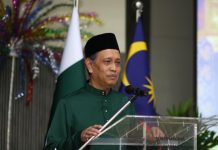ISLAMABAD: Finance Minister Ishaq Dar on Friday stressed there would be no further taxes on the agricultural and construction sectors in the wake of a $3 billion pact secured by Pakistan with the International Monetary Fund (IMF) last month.
Addressing the National Assembly yesterday, Dar recalled reading reports in “about a dozen newspapers” that new taxes would be introduced for the agriculture and construction sectors due to “strict conditions” put forward by the IMF
He then went on to clarify: “I am giving a categoric statement here that not even a single new tax will be applied, nei-ther on agriculture nor on construction [and] real estate [sectors].”
In a tweet later in the day, he reiterated his clarification: “No tax of any kind has been imposed on agriculture and con-struction and will not be imposed.”
His statement comes more than a week after the IMF’s Executive Board green-lit a $3bn stand-by agreement (SBA), which was secured on June 30 and offered some respite to Pakistan amid risks of default.
The long-awaited staff-level pact had been signed days after the government made changes to nexet year’s fiscal budget, including Rs215bn in additional taxes and expenditure cuts worth Rs85bn.
Yesterday, expanding further upon the “rumours”, Dar said that the nation had “endured [enough] pain” till now in order to secure the IMF programme, and that he had delivered on it.
Dar termed the rumours a “result of an extremely serious misunderstanding”, reiterating that such reports were run by about a dozen publications.
He further said that the reports had led to a “wave of concern among the agricultural community in villages”, who he said were fearing what new tax measures will be taken.
The minister recalled his windup speech when he announced changes in the FY 2024 budget, adding that the govern-ment has already “taken prior actions” — implying no new measures will be taken.
“Not a single penny’s additional burden will be put on them, whether it is the real estate or the agricultural sector,” Dar vowed.
At the outset of his address, the minister listed three documents relating to the IMF pact, which he requested that they be kept in the NA’s library so that they were accessible to all lawmakers.
Describing the documents, Dar said they comprised a letter of intent signed on June 30, a memorandum of economic and financial policies, and a technical memorandum of understanding.
Dar stated that all the said documents will be available on the finance ministry’s website by 12am tonight.
He appreciated all officials concerned for their hard work and dedication in completing the process of signing the IMF agreement, as well as the opposition for the role it played.
The minister then went on to explain the reason behind the government signing a new agreement instead of com-pleting the IMF’s ninth review, which ended on June 30.
Dar said if the ninth review had been continued, “there could not be a further extension in this programme”, and while the country would have secured $1.1bn, the $1.4bn due in the 10th and 11th IMF reviews would have been lost.
Therefore, he added, the government “tried that the $1.4bn is not lost” and the amount is received under a new pro-gramme.
The minister further said that the government aimed to secure a pact with the IMF worth $3.5bn instead of $2.5bn, but then the two parties mutually agreed on $3bn.
Explaining the reason for the agreement spreading over nine months — instead of a slightly longer period as suggest-ed by the lender — Dar said it was done so that when the new government comes to power, it would be free to make an “independent decision” on the way forward.
The minister also recalled the payments worth $2bn received from Saudi Arabia and $1bn from the United Arab Emir-ates earlier this month.
Moreover, Dar contended that the “storm of inflation should calm down” in the wake of the policies that the govern-ment has initiated.
He “shared confidentially” that as per estimates from the State Bank of Pakistan, consumer inflation was expected to drop to seven per cent in two years.
Stating that “all of us should try that we keep politics aside”, the minister went on to voice support for a “charter of economy”. –Agencies



